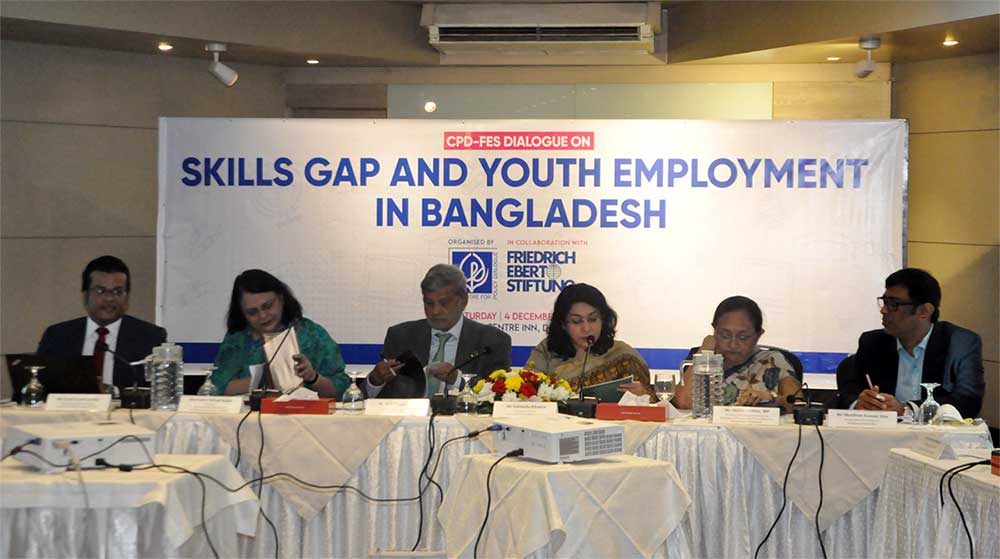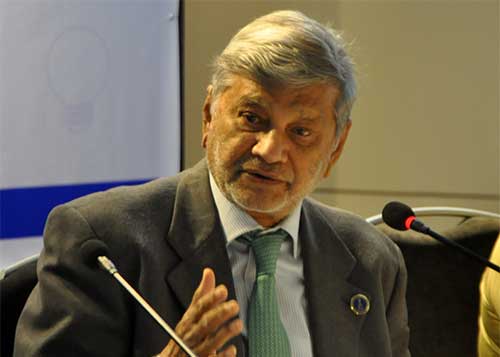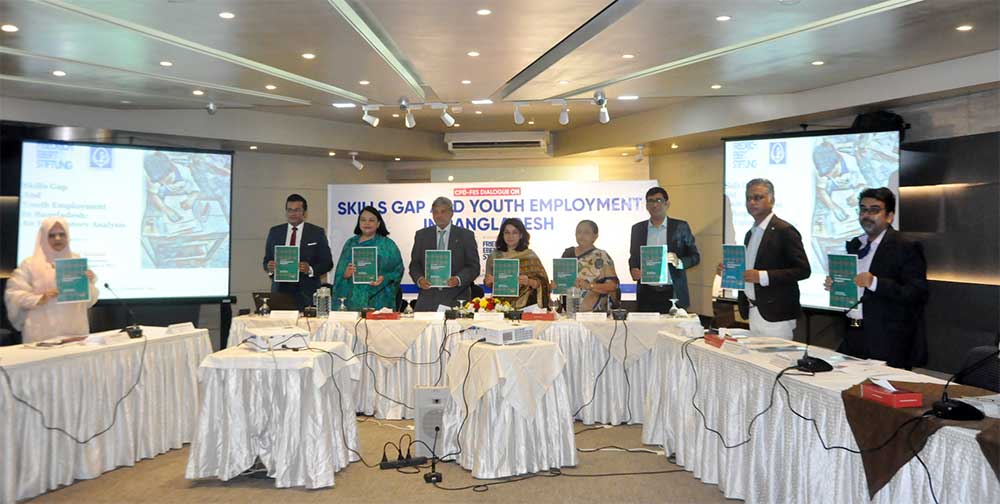
In a recent study titled “Skills Gap and Youth Employment in Bangladesh”, the Centre for Policy Dialogue (CPD) has highlighted the need for reducing the skills gap through concrete measures by the policymakers and the private sector. CPD organised a dialogue on the theme to disseminate the findings of the study on Saturday, 4 December 2021. The dialogue was organised by the CPD in collaboration with Friedrich-Ebert-Stiftung (FES) Bangladesh Office. CPD has surveyed 100 non-government employers engaged in various sectors of the economy, to understand what kind of skills they are looking for in job applicants. Based on the feedback received from the employers, CPD has developed a skills assessment test to evaluate the skills of 500 university students and recent graduates.
On behalf of the study team, Mr Syed Yusuf Saadat, Senior Research Associate, CPD, made the keynote presentation. He mentioned that the findings of the survey of employers showed that most employers preferred soft skills over hard skills. He added that within soft skills, most employers placed the highest importance on communication skills, followed by time management skills and problem-solving skills. He also mentioned that the findings from the online skills assessment of university students and recent graduates showed that the lowest average scores were obtained in communication and English language skills and numeracy and mathematical skills. He noted that comparing the skill preference ranking of the employers with the skill performance ranking of the university students and graduates showed that the greatest gap existed in communication and English language skills.
Dr Fahmida Khatun, Executive Director, CPD, moderated the dialogue. She said, this dialogue primarily aims at identifying the skills relevant to the labour market of Bangladesh and the skills gap, so that resources can be invested in the development of such skills in order to improve employability and earnings of the workforce and meet the demand of the labour market. It is a need of the hour to maximise benefits through engaging the youth in productive activities. In the discourses of employability and youth empowerment, sustained increase in private investment rather than concentrating on public investment alone, is crucial for employment generation, she added.

Mr M A Mannan, MP, Hon’ble Minister for Planning, Government of Bangladesh graced the dialogue as the Chief Guest. He said, Bangladesh has already been working on increasing skills and employment to meet the global market demand. Setting a positive tone, he highlighted government’s efforts and future initiatives in this context, and acknowledged the contributions of think tanks like CPD for voicing such serious concerns.
Ms Shirin Akhter, MP, Member, Parliamentary Standing Committee on Ministry of Primary and Mass Education, Bangladesh Parliament was the Special Guest of the dialogue. She said, better skilled labour force will boost our economy, and hence, supply-demand gap needs to be reduced. Communications skills need to be enhanced, and women empowerment should be ensured for this, she said.
Dr Kazi Mahmudur Rahman, Associate Professor and Coordinator, Master’s in Development Studies (MDS), Department of Social Sciences and Humanities, Independent University, Bangladesh (IUB), emphasised the importance of extra-curricular activities. A significant balance is needed between the soft skills and hard skills. “Many young people can speak good English, but lags far behind in terms of work efficiency. So, only communications skill will not be enough,” he said. He also added, all the discourse and analysis need to be discussed from the perspectives of urban-rural and public-private settings, and university curriculums should be designed taking into account long-term goals and benefits aligned with the industry.

Dr Salma Begum, Associate Professor, Department of Economics and Social Sciences (ESS), BRAC University opined that the young people opt for government jobs more due to underlying incentives and social norms. She identified demand-supply mismatch, deficiency of appropriate skills, and lack of career guidance for students as the core reasons behind the youth unemployment. She, too, focused on engaging industry in curriculum design.
Professor Md. Shazzad Hosain, Department of Electrical and Computer Engineering & Director, NSU Startups Next, North South University (NSU), echoed the importance of engaging industry with academia. He also focused on inter-disciplinary innovation.
Mr A K M Fahim Mashroor, Chief Executive Officer (CEO), Bdjobs.com Limited opined that the more important reason behind graduate unemployment is the youth’s attitude, more than the lack of skills, where their preference is shifted towards government jobs. He also emphasised industry engagement issue, and he suggested that government can channel funds for that.
Mr Syed Nasim Manzur, Chairman, Business Initiative Leading Development (BUILD), and Former President of Metropolitan Chamber of Commerce and Industry (MCCI), Dhaka, Bangladesh said that lack of communications skills as a whole is a problem. There is a gulf between the expectation of the candidates and the market reality. Mr Manzur raised the concern over the necessity of reforms in the secondary level of education rather than the tertiary level. Moreover, eliminating stigma surrounding vocational skills and encouraging cross-disciplinary skills enhancement are needed for translating potential into practice.
Barrister Nihad Kabir, President, Metropolitan Chamber of Commerce and Industry (MCCI) also talked about the mass preference towards government jobs, calling it a ”red herring”. To gear up employability, we need to adapt to technologies and innovation, and entrepreneurship as a profession should be encouraged, she said. She added, more employment-related opportunities need to explored and unfolded simultaneously at the ends of employers, employees and students.
Mr Shadhan Kumar Das, Programme Co-ordinator, FES, Bangladesh Office delivered the introductory remarks at the session. He mentioned that this is a timely research and FES was happy to collaborate with CPD.
The event was followed by an intriguing open-floor discussion. High-level policymakers, researchers, development practitioners, academics, business leaders, civil society representatives, international development partners, and journalists participated in the dialogue.


